#Enterprise Resource Planning Solutions
Text

Retail Solutions for Streamlining Operations and Boosting Sales
Discover how our retail solutions enhance operations, improve customer experiences, and drive sales growth. Explore our retail solutions to optimize operations, elevate customer experiences, and accelerate sales growth in your business
#accnu#accnuerp#besterpsolutionprovider#erp solutions#erpservices#erp partner#erp service provider#erp solution provider#enterprise resource planning software#enterprise resource planning solutions#erp system
0 notes
Text
#ERP services#Enterprise Resource Planning Solutions#enterprise resource planning application#enterprise resource planning software
0 notes
Text
We at Centredge providing solutions like PMO As A Service, Implementing Agile, drive projects, manage stakeholders,help in Contract management
#project management services#agile implementation services#program management services#enterprise resource planning solutions#microsoft consulting services
0 notes
Text
Boosting Efficiency: The Role of ERP Software in Modern Manufacturing Operations
In today's fast-paced manufacturing landscape, efficiency is not just a desirable trait; it's a necessity. To stay competitive and meet the demands of the market, manufacturers must streamline their processes, optimize resource utilization, and enhance decision-making capabilities. This is where Enterprise Resource Planning (ERP) software steps in as a game-changer. In this article, we'll delve into the pivotal role of ERP systems in revolutionizing manufacturing operations, particularly in India's thriving industrial sector.
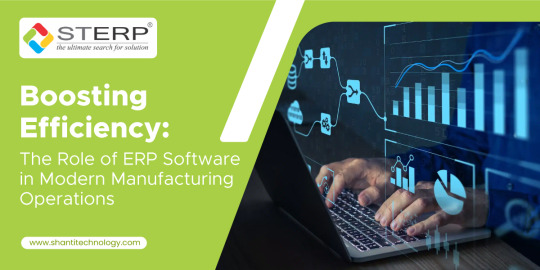
Understanding ERP for Manufacturing Industry
ERP systems for manufacturing are comprehensive software solutions designed to integrate and automate core business processes such as production planning, inventory management, supply chain logistics, financial management, and human resources. By consolidating data and operations into a unified platform, ERP empowers manufacturers with real-time insights, facilitates collaboration across departments, and enables informed decision-making.
Streamlining Operations with ERP Solutions
In the dynamic environment of manufacturing, where every minute counts, efficiency gains translate directly into cost savings and competitive advantages. ERP software for manufacturing offers a multitude of features that streamline operations and drive efficiency:
1. Enhanced Production Planning: ERP systems enable manufacturers to create accurate production schedules based on demand forecasts, resource availability, and production capacity. By optimizing production timelines and minimizing idle time, manufacturers can fulfill orders promptly and reduce lead times.
2. Inventory Management: Efficient inventory management is crucial for balancing supply and demand while minimizing holding costs. ERP software provides real-time visibility into inventory levels, automates reorder points, and facilitates inventory optimization to prevent stockouts and overstock situations.
3. Supply Chain Optimization: ERP solutions for manufacturing integrate supply chain processes from procurement to distribution, enabling seamless coordination with suppliers and distributors. By optimizing procurement cycles, minimizing transportation costs, and reducing lead times, manufacturers can enhance supply chain resilience and responsiveness.
4. Quality Control: Maintaining product quality is paramount in manufacturing to uphold brand reputation and customer satisfaction. ERP systems offer quality management modules that streamline inspection processes, track product defects, and facilitate corrective actions to ensure adherence to quality standards.
5. Financial Management: Effective financial management is essential for sustaining manufacturing operations and driving profitability. ERP software provides robust accounting modules that automate financial transactions, streamline budgeting and forecasting, and generate comprehensive financial reports for informed decision-making.
6. Human Resource Management: People are the cornerstone of manufacturing operations, and managing workforce efficiently is critical for productivity and employee satisfaction. ERP systems for manufacturing include HR modules that automate payroll processing, manage employee records, and facilitate workforce planning to align staffing levels with production demands.
The Advantages of ERP for Manufacturing Companies in India
India's manufacturing sector is undergoing rapid transformation, fueled by factors such as government initiatives like "Make in India," technological advancements, and globalization. In this dynamic landscape, ERP software plays a pivotal role in empowering manufacturing companies to thrive and remain competitive:
1. Scalability: ERP solutions for manufacturing are scalable, making them suitable for companies of all sizes – from small and medium enterprises (SMEs) to large conglomerates. Whether a company is expanding its operations or diversifying its product portfolio, ERP systems can adapt to evolving business needs and support growth.
2. Compliance: Regulatory compliance is a significant concern for manufacturing companies in India, given the complex regulatory environment. ERP software incorporates compliance features that ensure adherence to industry regulations, tax laws, and reporting requirements, minimizing the risk of non-compliance penalties.
3. Localization: ERP vendors catering to the Indian manufacturing sector offer localized solutions tailored to the unique requirements of the Indian market. From multi-currency support to GST compliance features, these ERP systems are equipped with functionalities that address the specific challenges faced by Indian manufacturers.
4. Cost Efficiency: Implementing ERP software for manufacturing entails upfront investment, but the long-term benefits far outweigh the costs. By streamlining processes, optimizing resource utilization, and reducing operational inefficiencies, ERP systems drive cost savings and improve overall profitability.
5. Competitive Edge: In a fiercely competitive market, manufacturing companies in India must differentiate themselves through operational excellence and agility. ERP software equips companies with the tools and insights needed to outperform competitors, adapt to market dynamics, and capitalize on emerging opportunities.
Choosing the Right ERP Software for Manufacturing
Selecting the right ERP solution is crucial for maximizing the benefits and ensuring a smooth implementation process. When evaluating ERP software for manufacturing, companies should consider the following factors:
1. Industry-specific functionality: Choose an ERP system that offers industry-specific features and functionalities tailored to the unique requirements of manufacturing operations.
2. Scalability and flexibility: Ensure that the ERP software can scale with your business and accommodate future growth and expansion.
3. Ease of integration: Look for ERP systems that seamlessly integrate with existing software applications, such as CRM systems, MES solutions, and IoT devices, to create a cohesive technology ecosystem.
4. User-friendliness: A user-friendly interface and intuitive navigation are essential for ensuring widespread adoption and maximizing user productivity.
5. Vendor support and expertise: Select a reputable ERP vendor with a proven track record of success in the manufacturing industry and robust customer support services.
Conclusion
In conclusion, ERP software has emerged as a cornerstone of modern manufacturing operations, empowering companies to enhance efficiency, drive growth, and maintain a competitive edge in the global market. For manufacturing companies in India, where agility, scalability, and compliance are paramount, implementing the right ERP solution can be a transformative investment that paves the way for sustainable success. By harnessing the power of ERP, manufacturers can optimize processes, streamline operations, and unlock new opportunities for innovation and growth in the dynamic landscape of the manufacturing industry.
#ERP software providers in India#Manufacturing enterprise resource planning#ERP systems for manufacturing companies#ERP system for manufacturing industry#ERP for manufacturing companies#ERP software for engineering company#ERP software for engineering companies in India#ERP software for engineering companies in Mumbai#ERP solution providers in India#ERP for manufacturing industry#ERP systems for manufacturing#ERP solutions for manufacturing#ERP software manufacturing industry#ERP for manufacturing company in India#India
7 notes
·
View notes
Text
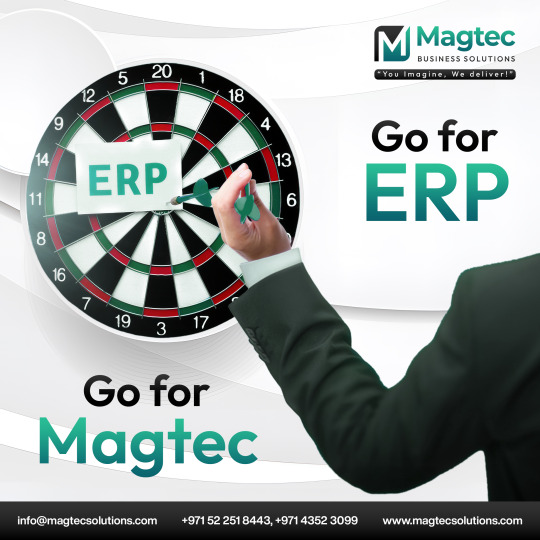
Hit the bullseye with the right ERP software! 🎯
Magtec Business Solutions helps you choose the perfect ERP solution to take your business to new heights.
Contact us today for a demo!
#erp#magtec#magtecsolutions#business#solutions#uae#software#technology#growth#success#innovation#digitaltransformation#cloud#enterprise#resources#planning#implementation#consulting#support#customization#integration#automation#efficiency#productivity#cost#savings
2 notes
·
View notes
Text
𝗥𝗲𝘃𝗼𝗹𝘂𝘁𝗶𝗼𝗻𝗶𝘇𝗲 𝗬𝗼𝘂𝗿 𝗠𝗮𝗻𝘂𝗳𝗮𝗰𝘁𝘂𝗿𝗶𝗻𝗴 𝘄𝗶𝘁𝗵 𝗔𝗜-𝗱𝗿𝗶𝘃𝗲𝗻 𝗘𝗥𝗣 𝗦𝗼𝗹𝘂𝘁𝗶𝗼𝗻𝘀!
Discover how integrating Artificial Intelligence with Enterprise Resource Planning can transform your manufacturing operations. Check out our latest blog post to explore the future of smart manufacturing:
Read more about the next wave of intelligent ERP systems and stay ahead in the digital transformation race!
https://www.codetrade.io/blog/ai-driven-erp-solutions-for-the-manufacturing-industry/
#artificial intelligence#machine learning#erp solution#manufacturing industry#ERP in AI#enterprise resource planning#intelligent ERP system#AI ML#AI-driven ERP solutions
2 notes
·
View notes
Text
SAP Business One for Chemical Industry
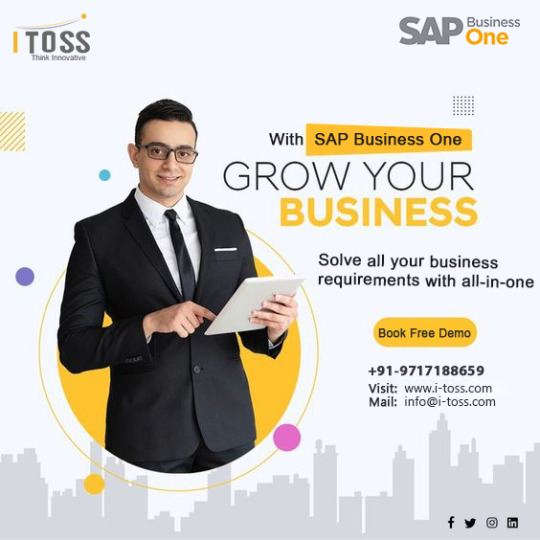
With all its benefits, global chemical manufacturing companies are incorporating SAP B1 at an increased rate for chemical production. Not only does it help in improving business efficiency and enhancing collaboration but it also aids in increasing customer satisfaction and increasing revenue by up to 10-30%. With the change in business dynamics and fluctuations in demand, robust ERP software can empower chemical businesses to take advantage of their competition while adhering to safety, quality, and compliance requirements. SAP b1 solutions are already used by nearly 6500 chemical industry businesses and more are soon to follow.
Managing costs effectively is an essential aspect of chemicals and any industry. In the chemical industry, SAP Business One provides intuitive planning and scheduling to manage time and resources efficiently and cut down on business costs to control every aspect. The cost of materials can also be estimated by analyzing the production data history and past purchases in a single click to simplify business processes. SAP chemical industry best practices optimize different processes, improve workflow efficiency, and reduce overtime costs by 48%.
#sap business one#SAP Business One Partner in India#SAP Business One partner#SAP Business One ERP Solution#SAP Business One for Manufacturers#SAP chemical industry#ERP Software#best erp software#best erp software in india#food beverage erp software#erp software for construction#erp#enterprise software#ERP Solution#SAP ERP#erp for small business#erp development company#erp consulting services#enterprise resource planning#erpsystem
2 notes
·
View notes
Text
Enterprise Resource Planning Services NYC

Streamline your business operations with our comprehensive Enterprise Resource Planning (ERP) services in NYC. AquSag Technologies offers tailored ERP solutions to optimize your processes, enhance efficiency, and drive growth. Our expert team specializes in implementing and customizing leading ERP systems, ensuring seamless integration and maximum ROI.
#ERP services NYC#enterprise resource planning#ERP implementation#ERP customization#business process optimization#ERP consulting#ERP software#ERP solutions
0 notes
Text
Understanding the Benefits of ERP and Product Lifecycle Management (PLM) Integration
Product Lifecycle Management (PLM) is the framework that guides a product from its earliest concept through design, manufacturing, and eventually, to its end of life. Managing this process effectively is essential for ensuring that products are developed on time, within budget, and in line with consumer expectations—but it’s easier said than done. Businesses often struggle with issues like data silos, where critical information is trapped within individual departments, making it difficult to collaborate. Additionally, the sheer complexity of managing product data across various stages can lead to inefficiencies and errors that hamper productivity and innovation.
Enterprise Resource Planning (ERP) systems offer a robust solution to many of the common challenges that businesses encounter with PLM. By providing a centralized platform that integrates various business processes, an ERP system can help improve data management and enhance overall efficiency. When businesses integrate their PLM systems with ERP, they can thus overcome obstacles such as fragmented data and poor communication—and, in the process, achieve smoother, more productive operations.
Here are five key benefits that businesses can achieve by integrating their PLM and ERP systems:
Improved Collaboration and Communication
Successful product development hinges on effective collaboration between multiple teams. However, in many businesses, teams work in silos, with limited visibility into each other’s work. Lack of communication can lead to misaligned goals, delays, and costly mistakes.
PLM-ERP integration provides a unified platform where all departments—from design and engineering to manufacturing and finance—can access the same up-to-date information. When everyone is working from the same data, communication becomes more transparent, and collaboration improves. Teams can coordinate more effectively and have an easier time keeping product designs aligned with manufacturing capabilities and financial goals.
Optimized Workflows
The world of product development is fast-paced and unpredictable. Companies need to move quickly from the initial design phase to production in order to stay competitive. However, disjointed systems can create bottlenecks that slow down this process. Integrating PLM and ERP allows businesses to streamline their workflows, allowing the transition from design to production to become smoother and faster. It’s possible, for instance, to automate data transfers and synchronize processes between product development and resource management.
Another significant advantage of streamlined workflows is that they reduce manual tasks through automation. Integrated PLM and ERP systems eliminate the need to enter data multiple times using different software. This not only saves valuable time but also minimizes the risk of human error associated with manual data entry. The result is a more agile organization that can respond quickly to changes in the market or customer demands, all while maintaining a high level of operational efficiency.
Cost Savings
Controlling costs is a top priority for businesses in any industry. One of the key ways to achieve this involves eliminating redundancies and inefficiencies that drain resources. When businesses integrate their PLM and ERP systems, they can cut down on redundant tasks, such as duplicate data entry and maintaining separate databases for product information and resources. Instead, all relevant data is stored in one place, which reduces the risk of errors and the costs associated with correcting them.
Furthermore, integrated PLM and ERP systems empower businesses to optimize their use of resources. When product design and manufacturing data are aligned within a single system, companies can better plan and allocate resources like materials, labor, and time. They can thus minimize waste, prevent overproduction or underutilization of resources, and ultimately incur lower operational costs.
Enhanced Decision-Making
Companies need access to accurate, up-to-date information in order to make the most strategic choices possible. When PLM and ERP systems operate in isolation, critical data may be scattered across different platforms. This, in turn, makes it difficult for managers to get a clear, comprehensive view of a product’s current situation. System integration allows businesses to consolidate their data into a single platform that provides real-time access to all the information they need. Managers can see the full picture—from product development to resource allocation—and can make more informed decisions that align with both short-term goals and long-term strategies.
Better Reporting and Compliance
Compliance with industry regulations is a critical concern for businesses, particularly those in highly regulated sectors such as healthcare, automotive, or aerospace. Businesses aiming to maintain compliance need to meticulously document and track every aspect of the product lifecycle, from design and development to manufacturing and distribution. PLM-ERP integration provides a centralized platform where all compliance-related data is stored and managed. The latest product designs, materials specifications, and manufacturing processes are always up-to-date and accessible via this platform.
PLM-ERP integration also makes it easier for companies to generate comprehensive and accurate reports. These reports are essential both for meeting regulatory requirements and for internal audits and performance reviews. With integrated systems, businesses can easily track and document compliance throughout the product lifecycle and verify that they meet all necessary standards. This capability helps avoid costly penalties and legal issues. It also builds trust with customers and partners by reinforcing the business’s reputation for quality and reliability.
Businesses that choose to bring together their PLM and ERP systems are getting more than just a technical upgrade. They’re essentially making a strategic move that can transform the way they operate in the long run. Breaking down silos and creating a unified platform to operate from can unlock significant efficiencies for any company. Ultimately, PLM-ERP integration positions companies for greater agility in a rapidly changing market and equips them to meet the demands of the future.
Germaine Ignacio
Germaine is a freelance writer. As a Psychology major, she is interested in how investing in personal growth and happiness can improve professional productivity. She is also an avid baker who lives with two cats.
Sample Works
Share in the comments below: Questions go here
#business solutions#productivity tips#product lifecycle management#enterprise resource planning#improved collaboration#improved communication#optimized workflows#cast savings#enhanced decision making#better reporting#better compliance
0 notes
Text
Off-the-Shelf ERP Software vs. Custom: Which is Right for Your Business?
Choosing the right ERP system is crucial for optimizing your business operations. Custom ERP software offers tailored features and scalability but comes with higher costs and longer implementation times. In contrast, off-the-shelf ERP solutions are more affordable and quicker to deploy but may lack specific customizations. PiERP bridges this gap by offering both custom and off-the-shelf cloud-based ERP solutions, ensuring flexibility to meet unique business needs. Whether you need a specialized system or a ready-to-use solution, PiERP’s scalable and adaptable options enhance productivity, streamline operations, and support sustainable growth, making it a valuable partner for your business success. For more details, visit: https://pierp.software/blogs/off-the-shelf-erp-software-vs-custom-which-is-right-for-your-business
#erp software#erp solution#erp systems#enterprise resource planning software#cloud based ERP solutions#ERP modules
0 notes
Text
Why IQ3 Enterprise Software is a Game-Changer for Modern Businesses

As businesses continue to grow and evolve, the need for a reliable and efficient Enterprise Resource Planning (ERP) system becomes increasingly apparent. The Revcord IQ3 Enterprise Software is designed to meet these demands, offering a comprehensive solution that helps businesses manage their resources, optimize operations, and achieve sustainable growth.
The IQ3 Enterprise Solution is more than just an ERP system; it's a transformative tool that brings together all aspects of your business into one cohesive platform. From inventory management to financial planning, IQ3 Solutions are designed to streamline processes and improve overall efficiency. The software's intuitive interface and advanced features make it easy for businesses to implement and use, reducing the learning curve and maximizing productivity.
A key component of the IQ3 Enterprise Software is the IQ3 Inspection Software, which is essential for maintaining quality control across all stages of production. This tool allows businesses to automate inspections, track defects, and ensure compliance with industry standards, all while reducing costs and minimizing human error.
Choosing the right ERP software is critical for any business, and with its innovative features and robust performance, it's no wonder that the Revcord IQ3 Enterprise Solution is considered one of the best enterprise resource planning software options on the market. By integrating this solution into your operations, you can ensure that your business is equipped to thrive in today's competitive environment.
#IQ3 Inspection Software#Revcord IQ3 Enterprise Solution#IQ3 Enterprise Software#Enterprise Resource Planning#best enterprise resource planning software
0 notes
Text
Enterprise Resource Management Software Tool for Modern Businesses
In today's fast-paced business environment, effective resource management is critical to maintaining competitive advantage. Enterprise resource management software in Hyderabad has emerged as an essential tool, enabling organizations to optimize their resources, streamline operations, and achieve strategic goals. This article delves into the key aspects of ERM software, its benefits, features, and considerations for implementation.
What is Enterprise Resource Management Software?
Enterprise Resource Management (ERM) software is a comprehensive solution designed to manage and integrate a company's core business processes. It encompasses various modules such as human resources, finance, supply chain, manufacturing, project management, and more. By centralizing data and processes, ERM software facilitates better decision-making, enhances efficiency, and supports scalability.
Benefits of ERM Software
Improved Efficiency: By automating routine tasks and processes, ERM software reduces manual efforts and minimizes errors. This leads to significant time savings and allows employees to focus on more strategic activities.
Enhanced Collaboration: ERM systems provide a unified platform for communication and collaboration across different departments. This fosters a collaborative work environment, improves coordination, and ensures that everyone is aligned with organizational goals.
Real-Time Data Access: With ERM software, businesses gain real-time access to critical data and analytics. This enables quick and informed decision-making, allowing organizations to respond promptly to market changes and emerging opportunities.
Scalability: As businesses grow, their resource management needs become more complex. ERM software is scalable and can be customized to accommodate the evolving needs of an organization, ensuring long-term sustainability.
Cost Reduction: By optimizing resource allocation and improving operational efficiency, ERM software helps in reducing costs. It also minimizes the need for multiple standalone systems, thereby lowering IT expenses.
Implementation Considerations
Needs Assessment: Conduct a thorough needs assessment to identify the specific requirements of your organization. This will help in selecting the right ERM software that aligns with your business goals.
Vendor Evaluation: Evaluate different ERP vendors based on their offerings, reputation, customer reviews, and support services. Consider factors such as scalability, ease of use, and integration capabilities.
Customization and Flexibility: Ensure that the chosen ERM software can be customized to fit your unique business processes. Flexibility is key to accommodating future changes and growth.
Training and Support: Invest in comprehensive training programs for your staff to ensure smooth adoption and efficient use of the ERP system in hyderabad. Additionally, opt for a vendor that provides robust customer support.
Data Migration and Integration: Plan for data migration from existing systems to the new ERM software. Ensure that the software can seamlessly integrate with other tools and applications used by your organization.
Enterprise Resource Management software is a vital asset for modern businesses seeking to enhance efficiency, streamline operations, and achieve sustainable growth. By centralizing data, automating processes, and providing real-time insights, ERM systems empower organizations to make informed decisions and stay ahead in a competitive market. Careful selection and implementation of enterprise resource planning solutions in hyderabad can lead to significant improvements in resource management and overall business performance.
#enterprise resource management software in hyderabad#enterprise resource planning software in hyderabad#enterprise resource planning solutions in hyderabad#erp system in hyderabad
0 notes
Text
Discover the Future of Business Management with Magnolia ERP Software

Magnolia ERP software offers an intuitive and streamlined admin panel layout, designed to empower companies in managing various departments effortlessly. Our solution enhances efficiency across the board, making it India's leading ERP software solution.
Why Choose Magnolia ERP?
Comprehensive Integration: Magnolia ERP simplifies accounting, finance, sales, purchasing, inventory, customer service, retail, and more processes.
Streamlined Workflows: Our ERP software seamlessly integrates and streamlines workflows, driving unparalleled productivity.
Enhanced Efficiency: Revolutionize your business operations with our user-friendly interface and robust features.
Unlock Your Company’s Full Potential
Join the numerous businesses that have transformed their operations with Magnolia ERP Solutions. Visit us today to learn more about how we can elevate your business to new heights!
#erp#erp software#erp system#magnolia erp#erp software solutions#benefits of erp#enterprise resource planning#erp solution#erp provider
0 notes
Text
Enterprise Resource Planning Solutions | Centredge Services
Centredge Services is an expert ERP Company provides the best Enterprise Resource Planning Solutions as per your business needs. Contact us today.
0 notes
Text
Manufacturing ERP: The Top 10 ERP Systems for 2024
Introduction:
In the dynamic landscape of the manufacturing industry, the right technology can make all the difference in streamlining processes and enhancing overall efficiency. Manufacturing Enterprise Resource Planning (ERP) systems have become indispensable tools for businesses seeking to integrate various facets of their operations seamlessly. As we step into 2024, the demand for robust ERP solutions continues to grow. In this blog, we will explore the top 10 Manufacturing ERP systems that are poised to make a significant impact on the industry this year.
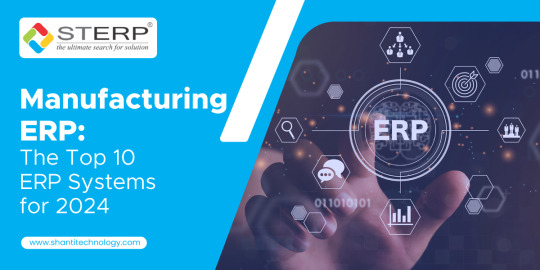
1. SAP S/4HANA: Pioneering Manufacturing Resource Planning System
One of the most trusted names in ERP, SAP S/4HANA stands out as a comprehensive Manufacturing Resource Planning System. Its real-time analytics, integrated modules, and intelligent automation make it an ideal choice for businesses aiming to optimize their manufacturing processes.
2. Oracle ERP Cloud: Empowering Manufacturing Enterprise Resource Planning
Oracle ERP Cloud offers a scalable and flexible solution for manufacturing enterprises. With its robust features, it caters to the diverse needs of businesses, ensuring a seamless integration of manufacturing operations. Its cloud-based architecture provides the agility required for modern manufacturing environments.
3. Microsoft Dynamics 365: A Versatile ERP Solution
Microsoft Dynamics 365 is gaining prominence as a Manufacturing Enterprise Resource Planning software that offers versatility and integration capabilities. Its user-friendly interface and interoperability with other Microsoft products make it an attractive choice for businesses, especially small enterprises.
4. Infor CloudSuite Industrial: Tailored Manufacturing ERP
Infor CloudSuite Industrial is designed with the unique needs of manufacturers in mind. It provides specialized functionalities, including supply chain management and shop floor control, making it a standout choice among ERP solution providers.
5. NetSuite ERP: Unifying Manufacturing Operations
NetSuite ERP is recognized for its ability to unify diverse manufacturing operations into a single, cohesive system. Its cloud-based platform allows for real-time collaboration and data accessibility, making it an efficient Manufacturing Enterprise Resource Planning Software.
6. Epicor ERP: Driving Growth for Small Businesses
Epicor ERP is particularly well-suited for small businesses in the manufacturing sector. With its focus on driving growth and improving efficiency, Epicor ERP offers a cost-effective solution without compromising on essential features.
7. IFS Applications: Comprehensive ERP Solution
IFS Applications is a comprehensive ERP solution that covers a wide range of manufacturing processes. Its modular structure allows businesses to tailor the system according to their specific requirements, making it a preferred choice for Manufacturing Enterprise Resource Planning.
8. IQMS Manufacturing ERP: Enhancing Shop Floor Control
IQMS Manufacturing ERP is distinguished by its emphasis on shop floor control and real-time monitoring. It empowers manufacturers with tools to optimize production processes and make informed decisions, positioning it as a top choice among ERP solution providers.
9. Acumatica Cloud ERP: Scalability for Growing Businesses
Acumatica Cloud ERP stands out for its scalability, making it an ideal choice for growing manufacturing businesses. With a flexible platform and advanced features, Acumatica supports businesses in adapting to changing demands and expanding their operations seamlessly.
10. SYSPRO ERP: Tailored for Manufacturing Success
SYSPRO ERP is tailored to meet the specific needs of manufacturing industries. Its focus on delivering a user-friendly experience and addressing industry challenges positions it as a reliable choice for Manufacturing Enterprise Resource Planning.
Conclusion:
As manufacturing industries evolve, the importance of robust ERP systems cannot be overstated. The top 10 ERP systems highlighted in this blog represent the cutting edge of technology, offering solutions that cater to the unique demands of the manufacturing sector. Whether it's SAP S/4HANA's real-time analytics, Oracle ERP Cloud's scalability, or Acumatica Cloud ERP's flexibility, each system brings its own strengths to the table.
For businesses in Madhya Pradesh seeking Manufacturing Software for Small Business, these ERP solutions provide a pathway to enhanced productivity and streamlined operations. Choosing the right Manufacturing ERP system is a critical decision that can impact a company's growth and competitiveness. Evaluate the features, scalability, and industry focus of each system to find the perfect fit for your manufacturing enterprise. Embrace the power of ERP in 2024 and position your business for success in the ever-evolving landscape of manufacturing technology.
#Manufacturing Software for Small Business#Manufacturing Enterprise Resource Planning Software#ERP Solution Providers in Madhya Pradesh#Manufacturing Enterprise Resource Planning#Manufacturing Resource Planning System#ERP Software#Chain Cycle Management#Business#Engineering#Manufacturing#India#Madhya Pradesh#Go-To-Market#GTM#ERP
7 notes
·
View notes
Text
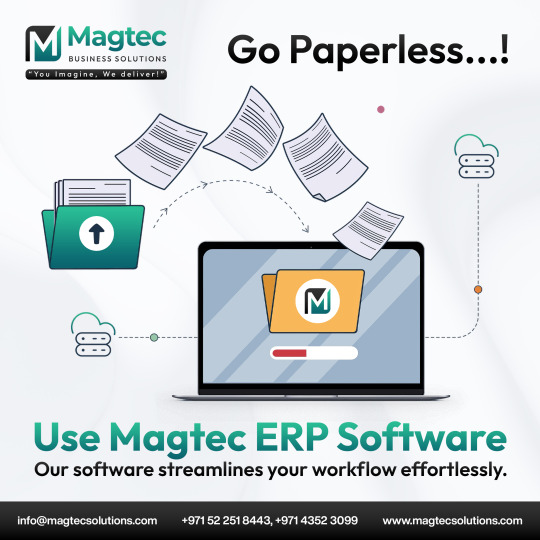
Tired of paper piles? 🚫 Go paperless with Magtec ERP Software! 💻 Streamline your workflow and boost efficiency. It's time to embrace the digital future.
#erp#business#software#management#automation#enterprise#resources#planning#solution#system#cloud#industry#finance#accounting#supplychain#inventory#crm#hr#manufacturing#distribution#retail#healthcare#education#hospitality#smallbusiness#mediumenterprise#largeenterprise#magtecerp#magtec#magtecsolutions
2 notes
·
View notes